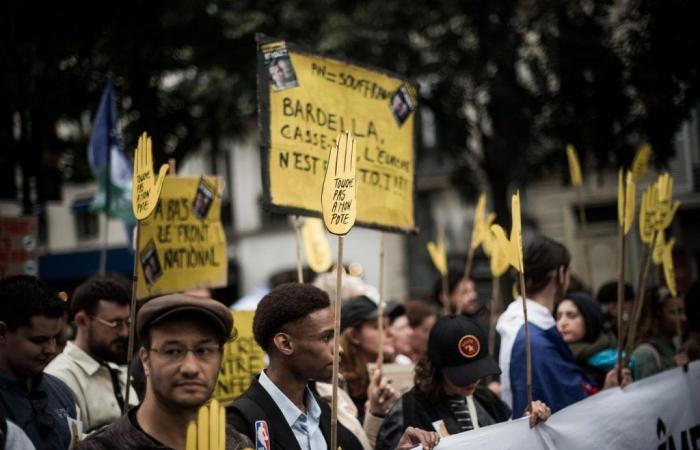Until now, Imen, a 30-year-old Franco-Moroccan born in Auvergne and a third-generation immigrant, felt perfectly integrated into French society. “My parents gave me all the keysshe explains. I have never lived in a city, I studied (a good preparatory class and a business school), I have worked in Lyon in a consultancy firm for six years, I am a property owner… Despite all this, Imen is very worried about the future if the National Rally were to come to power after the second round of legislative elections on Sunday July 7.
“My first and last name have an Arabic sound, she continues, and I notice that, since the dissolution, people are speaking out more freely.” “Comments are addressed to me directly, such as: “Be careful, it’s not halal”; “Does your mother know how to cook anything other than couscous?”; “Ah, do you drink alcohol?” Until now, she had never felt referred to her status as a person of immigrant origin.
From now on, “Some office colleagues tell me without any problem that they are going to vote RN. And clients ask me, for recruitment, to find them “local people”, “who eat pork”. I recently heard: “Arabs, no more than two per office otherwise it will cause chaos!””. In short, she notes, “They are no longer hiding! So, with the RN in power, they will be better protected.And me, on the contrary, I will no longer be!”
Right to discrimination
It is an understatement to say that the prospect of the RN possibly entering government worries people from immigrant backgrounds. In his program, Jordan Bardella makes this subject one of his three priorities. “There is already talk of reserving certain social benefits for the French, or of linking them to a working time for foreigners, observes in particular Grégory Abelli, responsible for the development of SOS Racisme in Île-de-France. And Jordan Bardella has already announced his intention to reserve social housing for French families. All this will backfire on many very modest households. But above all, with this national prioritythe RN will introduce into the law a sort of right to discrimination.
Already, “There is a certain paradox in France since we have both a strong mix in interpersonal relations and a persistence of very significant discriminationobserves Mirna Safi, professor of sociology at Sciences Po. For example, to get a response to a job offer, a candidate with an Arabic-sounding name must send 30% more CVs than a candidate with a French-sounding name. And it’s pretty much the same in the rental housing market. Today, the law prohibits this kind of discrimination. But imagine what it could become in a context where it would become acceptable, even praiseworthy, to stigmatize foreigners.”
Farrah, a 24-year-old Franco-Algerian student who has worn the veil for three years, feels particularly concerned by this risk of discrimination. “I feel like many people don’t want to see who I am anymore, they only see my veil. However, she specifies, I made this decision in an informed way and it hasn’t changed me. I like the same things as all young people my age, I study, I’m involved in associations, I go out.” Last year, Farrah was physically assaulted because of her veil. She also had to change driving schools after several inappropriate remarks from an instructor. So, she continues, “The fact that it could be banned in public spaces, as the RN wants, I can’t even imagine. It’s really a way of saying: you’re not one of us, you don’t belong here.”
These issues do not only concern the approximately 4.5 million immigrants of foreign nationality or even the 2.5 million naturalized immigrants. “If we go back to our grandparents, more than a third of the French population now has a link with immigration, continues sociologist Mirna Safi. So discriminatory practices towards people from immigrant backgrounds can actually affect many people, not to mention those who come into contact with them: friends, neighbours, parents of pupils, etc. This is very worrying for social cohesion.”
The prospect is particularly worrying for Sylane-Sactia. This 26-year-old, who grew up near Creil in an Indian family, joined Sciences Po thanks to an equal opportunities scheme and has just been admitted to the National Institute of Public Service, the new name of the ENA. “This school was a dream for me. I live in France, I believe in its values. But since June 9, I admit that I have been holding my breath.” He is particularly concerned about the RN’s plan to exclude dual nationals from certain strategic positions. Although he himself is not dual national, he fears the possible extension of the idea: “It starts with those who have dual nationality, but then it can be extended to French people of foreign origin, and then I will be directly concerned.”
Liberation of a racist word
Beyond the program, the main thing that people from immigrant backgrounds fear is the release of racist speech that has been contained until now by law and social norms. Are the dams already bursting? The Licra, which receives reports of racist or anti-Semitic acts, reports a 65% increase since June 9. “We have never seen such an increase, analyses Tina Theallet, head of public and legal affairs at Licra. And there seems to be a direct link with the idea that the RN will now be in power. For example, we are told about comments such as “Bardella in power, the Arabs to the slaughterhouse!” or “Mr. Bardella won the elections, so now it’s off to the plane.”
Mehdi, 21, who lives in Saint-Denis and is involved in the voluntary sector, fears this liberation of words and actions, particularly from the police, who, according to a Cevipof survey carried out in 2021, were 60% considering voting for Marine Le Pen in 2022. “Relations with the police have always been complicated in the neighborhoodrelate-t-il. I have witnessed blunders, injustices, shocking things. I know that they are not all bad. But, overall, I have never had confidence in this institution.
Last year, Mehdi lost the use of his right eye after being hit by a flash-ball during the riots following Nahel’s death. “Of course, the young people in the neighborhoods have their faults. But the police respond to provocations with force, while it is their job to manage tense situations. I fear that they will let themselves go even more if the National Rally comes to power.”






